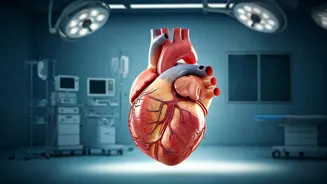Prioritizing Heart Health
To maintain a healthy heart, it's crucial to concentrate on key aspects. First, the right food choices are essential; avoid sweets, sugars, and heavily
processed oils. Instead, incorporate milk, curd, butter, desi ghee, eggs, fish, chicken, fruits, vegetables, and nuts like walnuts and almonds. Exercise is also important; walking for 30-45 minutes, five days a week, is recommended, coupled with strength training exercises twice a week to improve posture and reduce falls. Moreover, taking the right medications, and controlling diabetes, hypertension, cholesterol, weight, and thyroid issues is vital. Finally, adopting right habits like avoiding smoking, tobacco, alcohol, and other addictions, which can be supported by medicines to reduce the urge, along with the right thoughts like sleep and meditation, can make a huge difference.
Understanding Heart Attacks
A heart attack occurs when the arteries that supply blood to the heart muscle suddenly become blocked. This blockage typically results from the accumulation of plaque within the arteries. Plaque is composed of cholesterol deposits. The fat consumed is transported in the blood as triglycerides and chylomicrons, which are cholesterol-rich molecules. If the plaque ruptures, a blood clot can form, causing a sudden obstruction that deprives the heart of oxygen. Factors such as unaccustomed exertion, stress, smoking, hypertension, and diabetes can damage the thin tissue covering the plaque, leading to clot formation. Recognizing the underlying causes is a crucial step in prevention.
Symptoms and Diagnosis
It's essential to know the signs of a potential heart problem. Symptoms to watch out for include chest pain, shortness of breath, palpitations, or easy fatigue. Recognizing these early signs can prompt timely medical attention. Doctors have several tools at their disposal for diagnosis, from ECGs and echocardiograms to treadmill tests, CT coronary angiography, and coronary angiography. Regular follow-up with a cardiologist is crucial. Cardiac patients are advised to exercise regularly to help identify symptoms early if the condition worsens. Prompt diagnosis and treatment are vital in managing heart health.
Preventing Second Attacks
To prevent a second heart attack, it's crucial to manage the associated risk factors, such as diabetes, hypertension, smoking, stress, obesity, high cholesterol, and dietary indiscretions. If these risk factors continue, the arteries can narrow further, existing blockages can worsen, or the stent may develop tissue growth and close. It is also necessary to adhere to medical advice and take medications regularly as prescribed. Patients must not become complacent and resume unhealthy habits, such as smoking and consuming junk food. Avoiding these behaviours and maintaining proper health is vital to prevent a recurrence.
Lifestyle Adjustments Needed
Following a heart attack, making significant lifestyle changes is necessary. Dietary adjustments include avoiding sweets, sugars, and heavily processed oils, and favoring milk, curd, butter, desi ghee, eggs, fish, chicken, fruits, vegetables, nuts, and filtered oils. Regular exercise, such as 30-45 minutes of walking five days a week and strength training twice a week, can enhance heart health. Medication adherence, which includes managing diabetes, hypertension, and cholesterol levels, is also vital. It’s essential to quit smoking and limit alcohol and to prioritize good sleep and meditation to reduce stress and promote overall healing. All of these elements are critical for recovery.






















